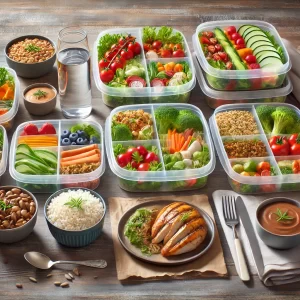The Essential Do’s and Don’ts of the Whole30 Diet for Weight Loss
Introduction
The Whole30 diet is a 30-day clean-eating program designed to help reset your eating habits, promote weight loss, and improve overall health by eliminating processed foods, sugar, grains, and dairy. While the rules of the Whole30 diet are strict, following the right approach is key to maximizing its benefits. In this guide, we’ll explore the essential do’s and  don’ts to help you succeed on the Whole30 diet and achieve your weight loss goals.
don’ts to help you succeed on the Whole30 diet and achieve your weight loss goals.
Do’s of the Whole30 Diet
1. Do Focus on Whole, Unprocessed Foods
The foundation of the Whole30 diet is whole, unprocessed foods. This means eating plenty of vegetables, fruits, lean proteins, and healthy fats while avoiding processed snacks, meals, and sugary condiments. By focusing on whole foods, you’ll reduce your calorie intake naturally while still providing your body with essential nutrients.
Building your meals around fresh, nutrient-dense foods will help you stay satisfied and energized throughout the day without relying on unhealthy processed options.
2. Do Plan Your Meals Ahead of Time
Meal planning is crucial for success on the Whole30 diet, especially since many common foods are off-limits. Take the time to plan your meals and snacks for the week, and prepare as much as you can in advance. This will ensure you always have Whole30-approved options on hand and reduce the temptation to reach for non-compliant foods when you’re busy or hungry.
Meal prepping will save you time during the week and make it easier to stick to the diet, especially during busy or stressful days.
3. Do Read Labels Carefully
Many packaged foods contain hidden sugars, grains, or additives that aren’t compliant with the Whole30 diet. Make it a habit to read labels carefully and avoid foods with ingredients like added sugars, soy, or dairy. Even condiments like ketchup, salad dressings, and sauces can contain non-compliant ingredients, so be sure to double-check labels before using them.
Focusing on whole, unprocessed foods will help ensure your success on the diet and make it easier to avoid hidden ingredients.
4. Do Stay Hydrated
Proper hydration is essential for overall health and weight loss, especially on the Whole30 diet. Drinking plenty of water supports digestion, helps flush out toxins, and keeps your energy levels up. Aim for at least 8 glasses of water per day, and consider drinking herbal teas or adding lemon to your water for extra flavor.
Staying hydrated will also help prevent cravings and overeating, as thirst is often mistaken for hunger.
5. Do Focus on Non-Scale Victories
While weight loss is often a goal of the Whole30 diet, it’s important to focus on non-scale victories as well. These can include improved energy levels, better digestion, clearer skin, and reduced cravings. Focusing on these health improvements  can help keep you motivated throughout the 30 days, even if the number on the scale isn’t changing as quickly as you’d like.
can help keep you motivated throughout the 30 days, even if the number on the scale isn’t changing as quickly as you’d like.
Celebrating these non-scale victories will remind you of the broader benefits of the Whole30 diet and help you stay committed to your health goals.
Don’ts of the Whole30 Diet
1. Don’t Eat Processed Foods
The Whole30 diet strictly prohibits processed foods, including anything with added sugars, preservatives, or artificial ingredients. Avoid packaged snacks, frozen meals, and anything that contains grains, legumes, dairy, or soy. These foods are often calorie-dense and lacking in essential nutrients, which can hinder your weight loss progress.
Stick to whole, unprocessed foods like vegetables, fruits, lean proteins, and healthy fats to get the most out of the Whole30 diet and support sustainable weight loss.
2. Don’t Skip Meals
Skipping meals can lead to overeating later in the day and disrupt your progress on the Whole30 diet. It’s important to eat balanced meals that include a source of protein, healthy fats, and vegetables at every meal to keep your energy levels stable and prevent excessive hunger.
Even if you’re not feeling hungry, try to eat three meals a day to maintain a healthy metabolism and avoid cravings for non-compliant foods.
3. Don’t Focus Solely on Weight Loss
While weight loss is a common goal of the Whole30 diet, it’s important not to focus solely on the number on the scale. The Whole30 diet is about more than just weight loss—it’s about resetting your eating habits, improving your relationship with food, and identifying any food sensitivities or triggers. Pay attention to how you feel throughout the 30 days, and celebrate the non-scale victories like improved energy, better digestion, and clearer skin.
Focusing on these broader  health improvements will help you stay motivated and maintain a positive mindset throughout the program.
health improvements will help you stay motivated and maintain a positive mindset throughout the program.
4. Don’t Give Up When It Gets Tough
The Whole30 diet can be challenging, especially during the first week when your body is adjusting to the elimination of certain foods. You may experience cravings, headaches, or fatigue, but it’s important to push through these tough moments. After the first week, many people report feeling more energized, focused, and satisfied with their meals.
If you’re struggling, reach out for support from the Whole30 community or find a buddy to do the program with. Having support can make a big difference in staying committed to the diet.
5. Don’t Jump Back to Old Habits After 30 Days
The Whole30 diet is designed to be a short-term program, but the lessons you learn during the 30 days can help you make long-term changes to your eating habits. After completing the Whole30, it’s important to avoid going back to old habits like consuming processed foods, added sugars, or unhealthy fats. Instead, reintroduce foods slowly and mindfully to see how they affect your body and continue focusing on whole, nutrient-dense foods to maintain your weight loss and health improvements.
Taking what you’ve learned from the Whole30 diet and applying it to your everyday eating habits will help you maintain your results and build a healthier, more sustainable relationship with food.
Conclusion
The Whole30 diet is a powerful tool for resetting your eating habits, improving your relationship with food, and promoting weight loss through clean eating. By following these essential do’s and don’ts, you can maximize your success on the Whole30 diet and achieve your weight loss goals while improving your overall health.
Focus on whole, unprocessed foods, stay hydrated, and plan your meals ahead of time to ensure long-term success on your clean-eating journey.